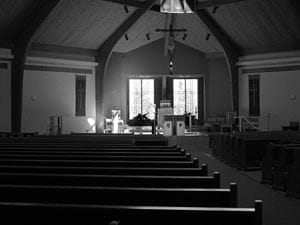
Millennials are leaving traditional organized religion behind for atheism and agnosticism in record numbers. For decades, people on both sides of the political spectrum have blamed politics for the exodus of young people. At first, religious leaders claimed that young people were leaving religion behind because religions were too liberal. Young people craved firm boundaries and wanted to be part of churches that would stick to their guns. Since the largest losses were among more liberal denominations such as Episcopalian and Presbyterian churches, liberalism seemed to be the problem. Then, however, conservative churches began to hemorrhage young people as well. Southern Baptists have lost more than a million members in the last decade alone, and the Church of Jesus Christ of Latter-day Saints has seen its growth rate fall to less than one percent. Liberal churches began to blame conservative denominations for chasing young people away by being too strict. Neither group, however, has been able to lure its younger generation back into the pews. If politics is not the problem, what is causing so many young people to jump ship?
Hostile Media and Celebrities
Young people consume media differently than older generations, and they consume more of it. On that media, they are shown overwhelmingly that the media and celebrities tend to associate Christianity with the extreme religious right. Young people want nothing to do with that. They want to be like their celebrity heroes who increasingly identify as Buddhist, Pagan, spiritual and non-religious. As such, young people who may already be shaky in their faith prefer to let it die than to put in the work to reinvigorate it.Smaller, Delayed Families
Marriage and children are shown to have an impact on church attendance. People who are married are far more likely to spend Sunday mornings in church. Parents are also more likely to fill the pews, and the larger the family the more likely it is that the parents will be involved in organized religion. For many years, this correlation was not anything to worry about because people tended to marry relatively young and have relatively large families. Millennials, however, have less interest than their parents in settling down. They would prefer to delay marriage and have few, if any, children. As such, the steadily declining fertility rate in the United States means that churches are getting older, greyer and emptier.Peer Pressure
Atheists can be every bit as zealous as members of any other religion, and the zealous do not tend to be afraid to get in someone’s face. Young Christians face mockery, scorn and rolled eyes from their friends and roommates. Christians are constantly called on to explain this strange verse or this esoteric fact about the Bible, and when they fail to do so, their atheistic friends declare that the Christians cannot explain it because their religion is a lie. Most Christian millennials do not have the sort of theological training required to answer the questions that come up in these rapid fire interrogations. Many Christians also do everything they can to avoid them in the first place. This leads to Christian millennials having a harder time finding likeminded friends, and thus they find themselves having to choose between their social support system and their faith. While pastors and priests would encourage Christians to hold tight to their faith, it is not always easy for a young person striking out on their own to give up the few friends they have made when they are alone in an unfamiliar city.Lack of Answers
Millennials as a group are a contradiction. They tend to be distrustful of authority, but many favor socialist and Marxist policies. Marxist and socialist utopian ideals, of course, are completely incompatible with Christianity which leads to more ardent socialist millennials turning their backs on churches. The distrust of authority, however, often comes in the form of millennials demanding answers to difficult questions or evidence to back up those answers. When religious authority figures cannot give those answers or millennials are not satisfied with the answers, many young Christians are left feeling doubtful and distrustful of their pastors, priests and ministers. This means that those who struggle with their faith are unlikely to go to the religious authority figures who could help them.Feeling Unwelcome
It is a vicious cycle. Millennials are unlikely to feel welcome in a church where most of the pews are filled with people who have grey hair and adult children. So, the millennials leave. This means that other millennials are even less likely to join the church, and those that consider it feel unwelcome. To get millennials to join, a church needs to have millennials already there. A church that already has millennials, however, is not as worried about attracting them.Age is not the only thing that keeps millennials feeling unwelcome. Many millennials have questions or doubts about their faith. These are the people who need a church community the most. Some churches, however, give off the feeling that every member of the congregation has perfect faith or that those who struggle with their beliefs are looked down upon and pitied. Millennials are a prideful group, and most would rather hit the streets than be given sad smiles every Sunday morning.
Millennials are leaving organized religion at an alarming rate, but too many churches are simply expecting millennials to come back on their own. Instead, churches need to recognize what the problems are and do what they can to fix them. Host events specifically for Christian singles to help draw in those that are unmarried. Make sure that millennials are made to feel at home. Welcome the difficult questions as a way to open a dialogue instead of seeing them as a challenge to authority. Understand that there is far more than politics that is making millennials hesitate to walk through church doors.

